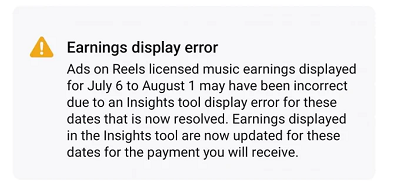Meta’s facing new backlash from short-form video creators, after its latest payment notifications for its Music Revenue Sharing program, which enables video creators to earn a share of in-stream ad revenue from their Reels on Facebook that contain licensed music, informed them of huge pending payout amounts, in error, which Meta has since been forced to correct.
As reported by Fortune, some Facebook creators were notified that they’d be receiving tens of thousands of dollars from the program, which was based on a glitch in Meta’s system.
Meta has since sent out a notification clarifying the mistake, and reducing those payouts significantly.

Meta launched its initial Music Revenue Share program, in July last year, but only recently expanded to program to Reels as well. As such, many creators had no precedent for what they might be able to earn via Reels clips, which has led to broader confusion around the initial payment notifications.
Meta says that the issue only impacted a small number of creators, and that all have now been notified of the mistake.
As social platforms battle to offer the best incentives for top creators, most are still ironing out their new payment structures, which is particularly applicable in the case of short-form video, where monetization is not as straightforward as longer content.
With most short clips being only 30 seconds in length, you can’t just chuck in pre- and mid-roll ads, which complicates performance attribution. With longer videos, you can definitively say that the number of viewers that saw the ad is attributable to that creator, but short form has forced a re-think of video monetization processes, in order to facilitate equitable and reliable income.
And no platform has perfected it just yet.
Snapchat has suffered from creator backlash over its flawed Spotlight payments model, which has seen creator payment amounts fluctuate, while YouTube’s new Shorts monetization program has delivered underwhelming results for many. TikTok doesn’t even have a good revenue share process, and as with Snapchat, creator funds simply aren’t sustainable, nor equitable on balance.
Meta’s payment issue is less associated with an incorrect system, as such, but it does highlight the challenges that apps are facing in monetizing shorter video content. That’s especially problematic given the huge engagement increases that short-form content has driven on virtually every app, and as such, they all want more exclusive short clips.
But no platform has separated itself as the best place to post to earn money from short-form as yet.
Meta’s misstep could also hurt its prospects on this front, with that initial creator angst potentially leaving a sour taste in people’s mouths.
Meta will now have to work to win back their trust, and with various other options out there, that could be a more significant blow than it might initially seem.



